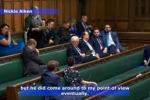This article by Nickie Aiken MP first appeared on Conservative Home on Friday, 2 February 2024. View the original article here.
Two hundred years ago, the Vagrancy Act (1824) made it a criminal offence to beg or be homeless on the streets of England and Wales. In 2022, my Conservative colleagues and I were proud to repeal this draconian and outdated act, and pave the way for compassionate, modern legislation to replace it in the Criminal Justice Bill.
Unfortunately, we now risk making the same mistake by criminalising – and in turn demonising – rough sleepers.
However, it is not too late. The Bill is currently in the committee stage, and I have called on the Home Office to prevent the criminalisation of rough sleeping and protect some of the most vulnerable people in society from further stigma.
We were elected in 2019 on a promise to end rough sleeping. While much progress has been made through the extension of the Rough Sleeping Initiative, there is more to do.
The Criminal Justice Bill contains wide ranging new powers for the police to deal with so-called ‘nuisance rough sleeping’ through being moved on, imprisoned, or fined up to £2,500, much like the Vagrancy Act.
Yet rough sleepers are often incredibly vulnerable individuals, having experienced significant trauma and some of the most severe health inequalities in their lives; 80 per cent of rough sleepers report mental health issues and 24 per cent have been forced onto the streets due to domestic abuse.
With 13 per cent of female rough sleepers having been raped in the last 12 months, are we going to make her night on the streets worse with the worry of a visit from a policeman, intent on locking her up? If criminalised, there is little hope of breaking this vicious cycle or helping these vulnerable people avoid prison, and it is no secret that our prisons are facing an overcrowding crisis as it stands.
What even is ‘nuisance rough sleeping’? The Bill is vague in its definition of ‘nuisance’, to such an extent that someone can fall under this term if they have slept rough, are ‘intending to sleep rough’, or ‘appear to have slept rough’ and are ‘are likely’ to cause a nuisance. In effect, a person doesn’t even have to have slept rough to be a ‘nuisance’ rough sleeper. The Bill is fundamentally flawed.
No one should be criminalised for being forced to sleep rough. Rough sleeping is not a choice nor is it a simple, clear cut issue. It is a complex socio-economic health issue that must be approached with the compassionate, preventative measures, and mental health support.
There is a reason why most countries do not criminalise rough sleeping: because it fails to address the fundamental issues that force people to put their lives at risk by sleeping rough in the first place. Mental ill-health and substance dependence will not be resolved through imprisonment.
Imprisoning or fining these individuals does not help get them off our streets. As One Nation Conservatives we believe in compassion, and strive to look after the most vulnerable in society.
We can all agree that one person sleeping rough on the streets is one person too many. I have seen it myself as a local constituency MP, in the cities of London and Westminster. They are susceptible to the most freezing living conditions, as we have seen in the past few weeks, and at times the most heinous of sexual and substance abuse.
While we must be realistic that we are unlikely to eliminate rough sleeping in its entirety, I am committed to trying. What we can do is reframe the narrative and widen our understanding of rough sleeping, whilst providing police and local authorities with the clarity they need to tackle nuisance begging.
What has changed in the time since Parliament has voted to repeal the Vagrancy Act? Nothing. We have the same MPs who remain committed to our promise to end rough sleeping. Criminalising rough sleeping would be at odds with the direction that our Government is taking, and I trust that this view is shared by many of my colleagues.
With the Criminal Justice Bill in its committee stage, now is the time to act. If the Government continues with these inappropriate clauses then I will table an amendment when the Bill reaches the report stage, alongside my colleagues Tracey Crouch and Bob Blackman, to remove ‘nuisance rough sleeping provisions’ entirely from the Bill.
We must recognise that rough sleeping is not always a choice, or we risk making the issue worse. If this amendment helps five fewer people sleep rough then we’re on the right track. We have the chance to address the root causes of this issue and as compassionate conservatives, we have a duty to help those in need.





